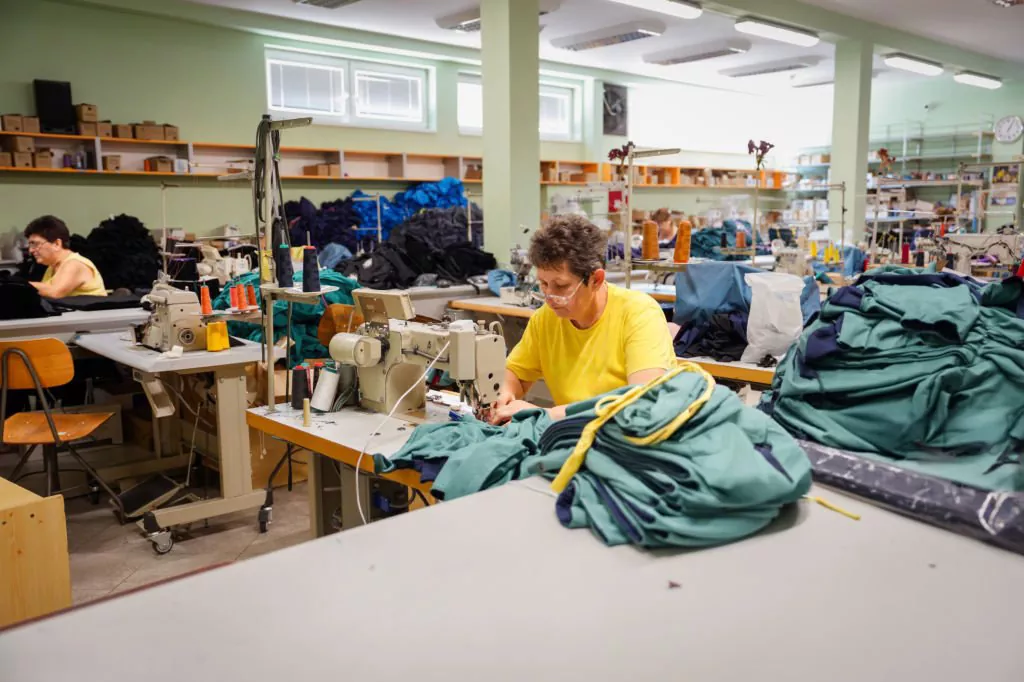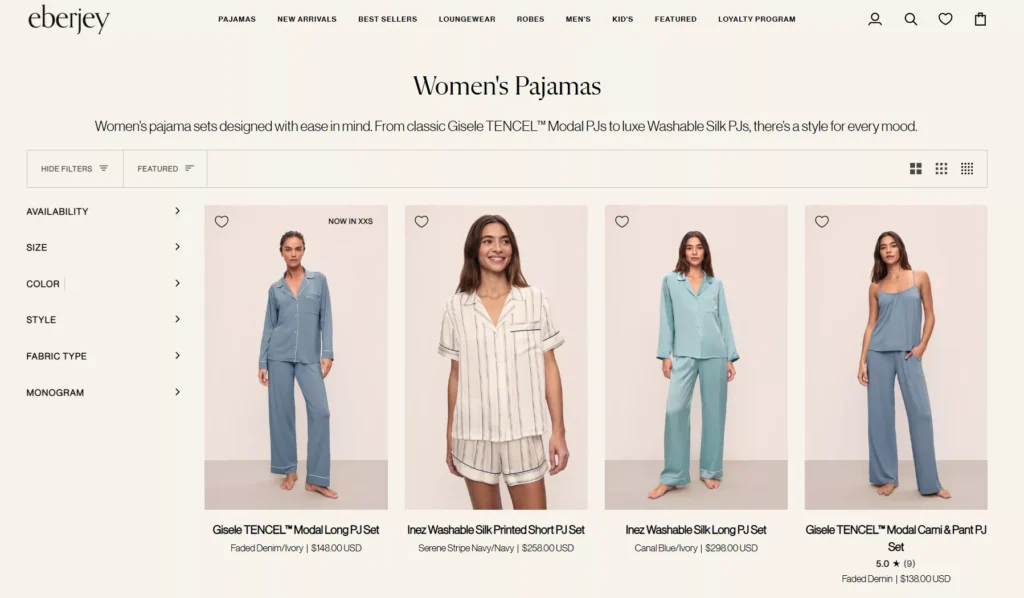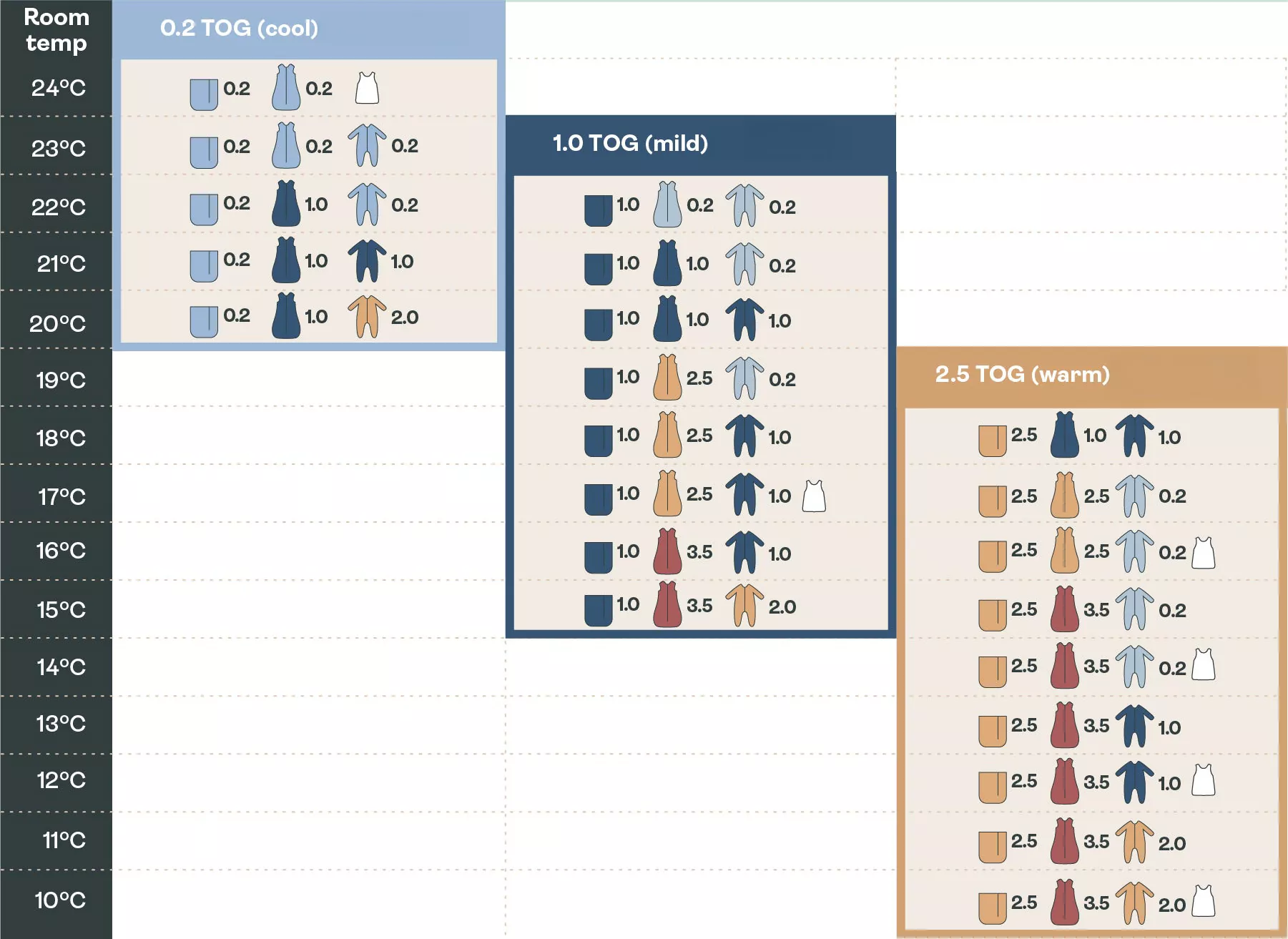In today’s consumer market, consumers’ demand for pajamas and loungewear has quietly changed. They are no longer satisfied with simple comfort and functionality but are gradually moving towards personalization and high quality. In this transformation, private label manufacturers play an increasingly important role in small batch customization. This page will deeply analyze how they can reshape the small-batch pajamas and loungewear market using their unique advantages.

Market status analysis
(I) Market development trend of small batch pajamas and loungewear
In recent years, the small batch pajamas and loungewear markets have shown strong growth. According to data from authoritative market research institutions, the global small-batch pajamas and loungewear market size has grown at an annual compound rate of about 8% over the past five years and is expected to continue stable growth for the next three years. Behind this growth lies a significant change in consumer demand. Today’s consumers are no longer satisfied with popular styles on the market. They want to show their personal style and unique taste through their clothes and have higher requirements for the materials, design details, and wearing experience of the products. Elements such as natural and environmentally friendly fabrics, exquisite embroidery, and unique tailoring designs are increasingly favored by consumers.
(II) Dilemma of traditional large-scale production model
In the current market environment, private label manufacturers are emerging as a contrast to the traditional large-scale production model. The disadvantages of the traditional model, such as its inability to meet the segmented market’s demand, are becoming more and more obvious, while private label manufacturers are stepping in to fill the gap. This model is based on cost control and efficient shipment as the main direction, and tries to pursue economies of scale. This makes the product styles relatively simple and it’s hard to fully meet consumers’ increasingly diverse and personalized design demands. Not only that, its production lead time is long and complicated. From the final design to the launch of the finished product on the market, it often takes several months. It’s completely impossible to keep up with the constantly changing fashion trends. Moreover, large-scale production also has extremely high inventory risks. Once the market demand forecasts are wrong, it will cause a large inventory backlog, taking up a huge amount of capital flow and bringing a heavy burden to corporate operations. Take H&M, a world-famous fast fashion brand, as an example. It once misjudged the market demand of a simple cotton pajama among young consumers and then carried out large-scale production. However, because the design of this pajama lacks unique and attractive features, it fails to accurately match the needs of young consumers to pursue personality and show themselves. Its sales performance after its launch was very poor. In order to clear inventory, H&M had to adopt a major price reduction promotion strategy. This not only greatly reduced profits, but also had an irreversible negative impact on the brand image.
The unique advantages of private label manufacturers
(I) Customized Service
Private label manufacturers are dedicated to providing customers with one-stop customization services to create a unique product experience. During the style design stage, they formed a professional design team to communicate deeply with customers and accurately understand the customers’ style preferences for pajamas and loungewear. Whether it’s the elegant and luxurious retro palace style, the fashionable and stylish modern style, or the dynamic and energetic sporty style, they can be perfectly presented through exquisite design. Customers can also take part in the design process throughout, come up with creative ideas, and then have them turned into detailed design drawings by experienced designers.
In terms of fabric selection, private label manufacturers offer a wide range of choices, including skin-friendly pure cotton, cool mulberry silk, soft and breathable modal, eco-friendly bamboo viscose, etc., to meet the various needs of different customers for comfort and functionality. In terms of detailed decoration, from the material and style of buttons to the width and pattern of laces, each part can be carefully made according to customer requirements, fully meeting the niche aesthetics and personalized pursuits.
(II) Flexible production
Small-scale production is a key feature of private label manufacturers, and it gives them extremely high flexibility. This flexibility allows private label manufacturers to adapt quickly to market changes. Fashion trends change rapidly, and when new design elements or fabrics become popular in the market, they can react quickly. Compared to the production lead times of traditional mass production of several months, private label manufacturers can complete the entire process from design adjustment to finished product production in just a few weeks. This not only enables them to keep up with the market trends and quickly launch products that match the current trends, but also avoids missing the best sales opportunity for the product to enter the market due to the long production lead time. In addition, small-scale production means that the order quantity per design is limited, greatly reducing the risk of inventory backlog, and companies don’t need to worry about large amounts of unsold inventory.
(III) Cost-effectiveness
For small brands or start-ups – these are the main partners of private label manufacturers. The small-volume production model of private label manufacturers has significant advantages in cost control. Large-scale production often requires huge upfront costs, covering large-scale procurement of raw materials, leasing large-scale production sites, and purchasing large-scale production equipment. In contrast, small-scale production doesn’t require such a huge initial investment. Enterprises can flexibly plan production processes based on the order quantity and effectively reduce the one-time investment of funds. Not only that, small-scale production can also effectively avoid inventory backlogs, greatly reduce the costs caused by inventory management and processing of unsold products, greatly easing the financial pressure of small brands or start-ups, allowing them to allocate their funds more rationally to core links such as brand promotion and product research and development to help the company develop stably.
Innovative measures to promote market change
(I) Design Innovation
Design innovation always holds a central position in the strategic layout of private label manufacturers. They either actively work with well-known designers in the industry to use their wisdom and power; or they invest a lot in internal talent training, form independent design teams, and continuously add fresh creativity to their products. Their eyes are closely focused on global fashion trends, deeply analyze the trends, and cleverly integrate cutting-edge design concepts into the design of pajamas and loungewear, striving to find a perfect balance between practicality and fashion. Taking the popular splicing elements at the International Fashion Week as an example, private label manufacturers boldly applied them to pajama designs, carefully creating a series of comfortable and eye-catching pajama styles, successfully leading a new fashion trend in the small batch of pajamas and loungewear market.
(II) Technological innovation
At the production process level, private label manufacturers keep exploring the application of new technologies. They actively introduce advanced fabric processing technology, aiming to improve the texture and functionality of the fabric in all aspects. For example, nanotechnology is used to give waterproof and antibacterial properties to fabrics, making pajamas and loungewear not only comfortable but also more practical. At the same time, they have invested a lot in the use of smart sewing equipment, greatly improving production efficiency and ensuring product quality. With the help of smart devices, manufacturers can accurately control the needle pitch and suture tension, ensuring that the sewing quality of each finished product meets the industry’s high standards and meets consumers’ pursuit of high-quality products.
(III) Marketing model innovation
Private label manufacturers actively work with brands to carry out innovative marketing activities. They deeply explored the potential of social media platforms, carefully planned and released a series of visually attractive product pictures, as well as interesting outfit videos. These were like magnets and successfully attracted the attention of a large number of consumers. In addition, private label manufacturers have reached in-depth cooperation with Internet celebrity experts, cleverly using the strong influence of Internet celebrities and their huge fan base to promote products in all aspects and steadily expand market share. For example, we joined forces with well-known Internet celebrities in the field of home life to hold a live streaming event. During the live broadcast, the anchor vividly showed the upper body effects of pajamas and loungewear. With the anchor’s professional explanation and wonderful demonstration, it successfully aroused consumers’ purchasing enthusiasm and set off waves of buying crazes.
Cooperation case display

Since its establishment, fashion brand Eberjey has focused on the high-end pajamas and loungewear markets. In its initial stage, it worked with the well-known private label manufacturer-Pjgarment. With the help of Pjgarment’s professional small-batch customization service, it opened the brand’s brilliant path. During the design process, the teams of both sides communicated closely and studied the current trend of fashion. They cleverly integrated popular elements such as retro florals and animal patterns into product design, making pajamas and loungewear both comfortable and fashionable. In terms of fabric selection, Eberjey adheres to high-quality requirements. Pjgarment assists it in screening top-quality natural materials, such as luxurious mulberry silk and soft Tencel Modal. These have a delicate touch and show high-end quality. In terms of marketing, Eberjey makes full use of social media platforms to publish exquisite product pictures and outfit videos. At the same time, it cooperated with fashion and life online celebrities. Through the real wear display and recommendation of Internet celebrities, the products quickly stood out in the market, and achieved a qualitative leap in brand awareness and sales, and successfully gained a foothold in the high-end market.
In the above cases, private label manufacturers fully use their advantages such as customized services, flexible production and innovative marketing support to help emerging brands open up differentiated competitive paths. From carefully crafting product design, to precisely controlling the production cycle, to actively carrying out market promotion, private label manufacturers have worked deeply throughout the process, allowing emerging brands to break through highly competitive markets, quickly open up the market situation, and gain a foothold.
Challenges and response strategies
(I) Challenges Facing
Private label manufacturers have actually faced many obstacles in the process of booming development. The first thing they have to deal with is the tricky problem of unstable supply of raw materials. In the production field of small batch pajamas and loungewear, the supply channels for some high-quality and special materials, such as mulberry silk, organic cotton, and high-tech fiber fabrics with special functions, are very limited. The number of suppliers of these fabrics is small and mostly concentrated in specific regions, which makes the procurement process full of uncertainties. Not only that, the price of this type of fabric is like a roller coaster, and the fluctuation is very large due to various factors such as supply and demand in the international market, climatic conditions of the origin of raw materials, and changes in trade policies. For example, when the international market demand for a particular fiber surges, its price may double in a short time, which undoubtedly greatly increases production costs and compresses profit margins.
In addition, the shortage of professional design and technical talents has also become a key bottleneck that restricts the development of enterprises. In the current market environment where competition is fierce and consumer demand is increasingly diversified, small-batch pajamas and loungewear not only need to have a comfortable wearing experience, but also keep up with fashion trends to meet consumers’ pursuit of personalization and aesthetics. This requires that enterprises have professional design talents who can accurately grasp market trends and constantly innovate. However, the reality is that such professional design talents are in short supply in the market and it is extremely difficult to recruit. At the same time, there is also a shortage of technical talents. For example, the number of skilled workers who master advanced sewing technology and fabric processing technology is limited, which is difficult to meet the growing market order demand of enterprises and the increasingly strict innovation requirements. Enterprises have a hard time balancing innovative design and efficient production, and their development pace is therefore significantly limited.
(II) Coping strategies
In response to the raw material supply issues, private label manufacturers have shown a positive and forward-looking response strategy. On the one hand, they conducted extensive market research and deeply explored potential high-quality suppliers. Through multiple rounds of business negotiations and communication, they successfully established long-term and stable cooperative relationships with many suppliers with outstanding reputation and excellent quality in the field of raw materials. These cooperations are not superficial. Instead, by signing detailed and binding contract terms, they ensure the stable supply of raw materials in all aspects, from supply quantity, quality standards to delivery cycles, and lay a solid foundation for the smooth progress of the production process. On the other hand, they formed a professional market analysis team and used advanced data analysis tools and models to conduct real-time monitoring and in-depth analysis of the price trends of the raw material market, changes in supply and demand relationships, etc. Based on the accurate analysis results, a scientific and reasonable procurement plan is formulated in advance. The procurement volume is increased in time when the price is relatively low, and the procurement strategy is flexibly adjusted when the price fluctuates greatly, so as to effectively reduce the cost risks brought by price fluctuations.
In terms of talent training, private label manufacturers deeply understand the key role of design and technical talents in companies to stand out in the fiercely competitive small-batch pajamas and loungewear market. Therefore, they have increased their efforts to introduce these two types of talents and attracted outstanding talents in the industry to join by providing competitive salary, a comfortable working environment and a broad career development space. At the same time, they actively carry out in-depth cooperation with well-known domestic clothing design colleges and textile technology colleges and jointly carry out talent targeted training projects. According to the company’s own development needs and market trends, they provide course setting suggestions for colleges and universities so that students can get access to professional knowledge and skills closely integrated with actual production during their studies. In addition, the company has established a complete talent incentive mechanism and established various incentive forms such as project bonuses, innovation rewards, and year-end dividends. It will give generous rewards to talents who have performed outstandingly in design innovation, technological improvement, etc., so as to attract and retain outstanding talents and inject continuous impetus into the continuous innovation and development of the company.
Future prospects
Looking ahead, private label manufacturers will undoubtedly continue to play a key role in the small-batch pajamas and loungewear market. As consumers’ pursuit of personalized and high-quality products increases, they will continue to make breakthroughs and innovations, deeply optimize the service system, continue to deepen their efforts at the customization level, and do their best to improve the level of customization. At the same time, they actively introduce more cutting-edge technologies and strive to improve production efficiency in all aspects and polish product quality. In addition, cooperation with brand owners will also move towards a new stage that is closer and more diverse. The two parties work together to explore a broad market, inject a steady stream of development momentum into the small-batch pajamas and loungewear markets, and promote the industry to move forward steadily. Here, we sincerely encourage enterprises or individuals in need to actively establish cooperative relationships with private label manufacturers, jointly explore the hidden opportunities in the market, and work together to move towards a new situation of mutual benefit and win-win.
FAQ
How are private label manufacturers different from traditional mass production?
Private label manufacturers provide customized services that can meet niche aesthetics and personalized needs, flexible production, can quickly respond to trends, reduce inventory risks, and low initial investment costs for small-scale production; while traditional large-scale production products are single, with production lead time Long, high inventory risk, and large initial investment.
How do private label manufacturers innovate in design?
Cooperate with well-known designers or independently cultivate a design team, pay attention to global fashion trends, and integrate cutting-edge design concepts into products, such as using international fashion week trend elements for pajama design.
What challenges do private label manufacturers face?
Faced with the challenges of unstable supply of raw materials, limited supply channels for high-quality special fabrics, large price fluctuations, and a shortage of professional design and technical talents, it is difficult to meet market demand and innovation requirements.
For small brands, what are the benefits of choosing a private label manufacturer?
Small brands can enjoy small batch production, reduce early capital investment, avoid inventory backlog, reasonably allocate funds to brand promotion and product research and development, and also obtain customized products to meet the personalized needs of target customers and enhance brand competitiveness.
How do private label manufacturers deal with raw material supply issues?
Actively expand supply channels, establish long-term cooperation with many high-quality suppliers, strengthen monitoring and analysis of raw materials markets, and make procurement plans in advance to reduce the risk of price fluctuations.



